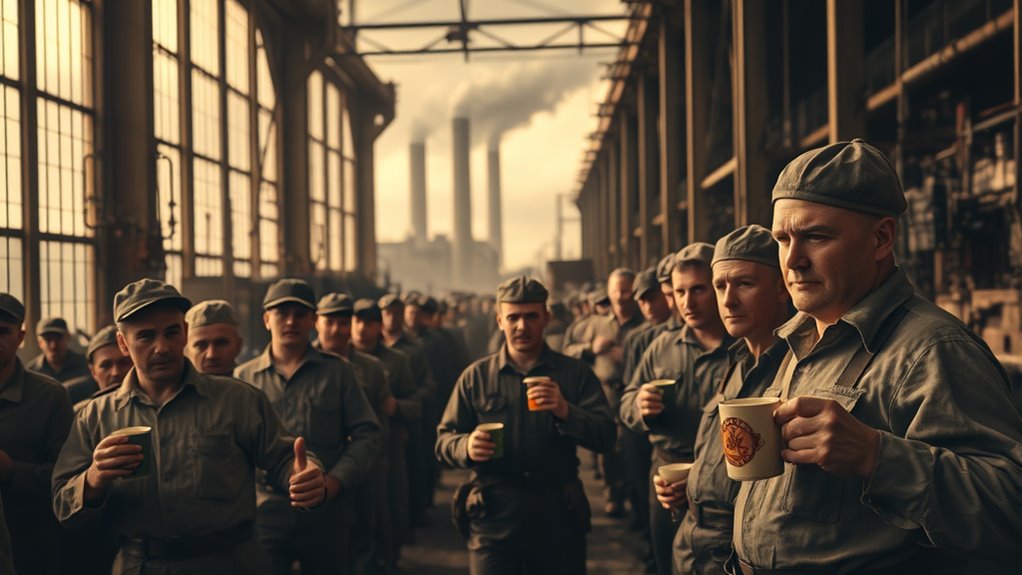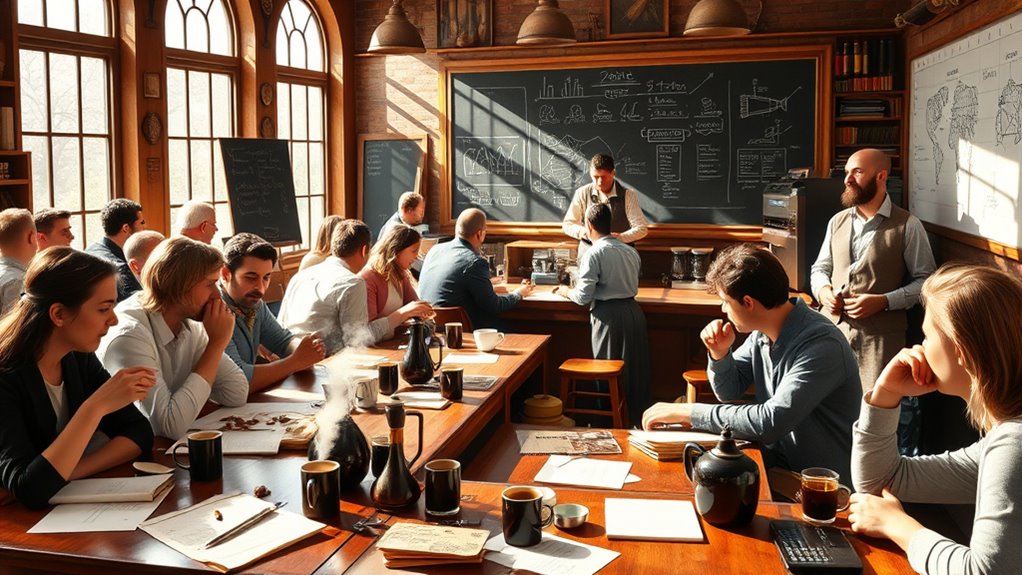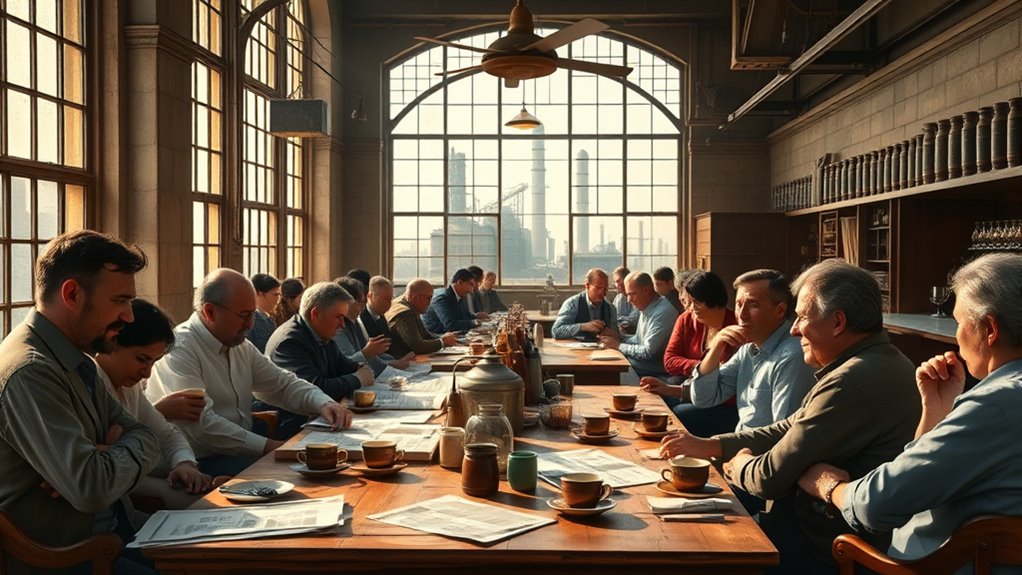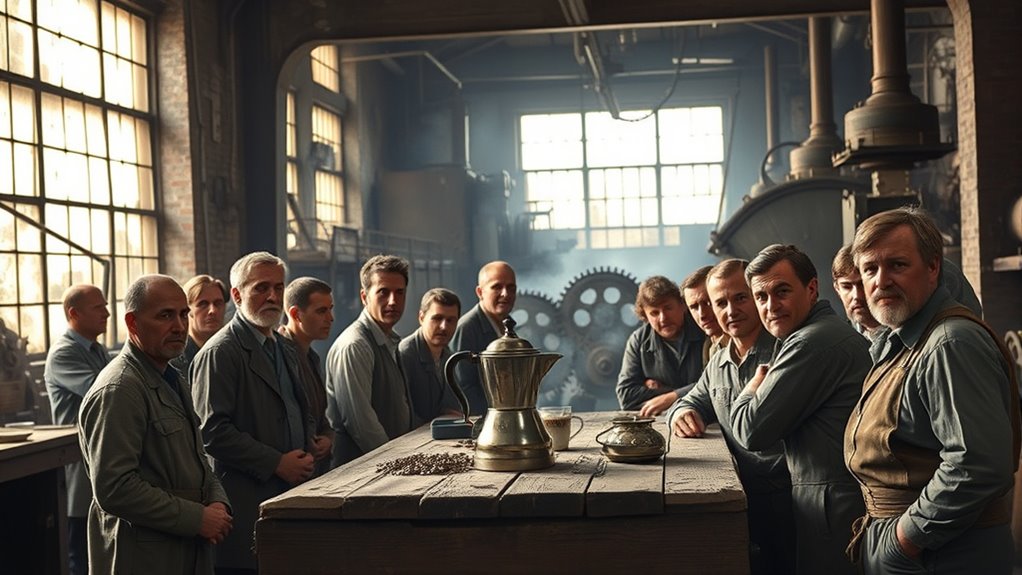Coffee fueled the Industrial Revolution by boosting workers’ productivity and focus. It replaced alcohol as the go-to stimulant, enhancing mental clarity and safety on the job. Coffeehouses transformed into vibrant hubs for discussion and innovation, fostering collaboration and idea-sharing among diverse individuals. Its health benefits, like providing essential nutrients and antioxidants, allowed laborers to endure long shifts. This shift not only improved work performance but also reshaped social dynamics during this transformative period. There’s more to uncover about coffee’s lasting impact.
Key Takeaways
- Coffee provided a crucial energy source for laborers, enhancing focus and productivity during long working hours of the Industrial Revolution.
- The shift from alcohol to coffee improved workplace safety, reducing intoxication and promoting clearer thinking among workers.
- Coffeehouses served as innovation hubs, facilitating discussions and collaborations that sparked social and economic changes during industrialization.
- Nutritionally, coffee offered vital nutrients and energy, helping laborers combat fatigue and poor diets while boosting metabolic function.
- The cultural impact of coffee fostered a sense of community and commitment to productivity, shaping work ethics and social interactions.
The Role of Coffee in the Lives of Factory Workers

As factory workers toiled through grueling shifts, coffee became their go-to source of energy and focus. This stimulating beverage offered a crucial alternative to alcohol, which often led to drunkenness and decreased productivity.
During the Industrial Revolution, many workers shifted from beer to coffee, recognizing its ability to boost alertness during long hours of monotonous, hazardous tasks. Coffee wasn’t just an energizer; it was a cheap and accessible source of sustenance compared to fresh produce or meat.
Historical accounts show that workers who consumed coffee performed their jobs with greater clarity and efficiency.
Furthermore, coffeehouses emerged as important social hubs, allowing workers to connect and discuss labor issues, fostering a sense of community amid the challenges of industrial life.
A Shift From Alcohol to Caffeine

During the Industrial Revolution, you’d find many workers starting their day with a beer instead of breakfast.
As coffee emerged as a popular alternative, it transformed how people approached their work, boosting alertness and productivity.
This shift from alcohol to caffeine not only enhanced focus but also marked a significant change in workplace culture.
Alcohol’s Daily Consumption Patterns
How did daily consumption patterns shift from alcohol to caffeine during the Industrial Revolution?
For many, alcohol’s daily consumption patterns included starting the day with beer soup, a common breakfast drink even for children. In London, people guzzled an astonishing 200 million quarts of beer annually, relying on it for calories and hydration.
However, this habit often led to intoxication, which hampered clear thinking and safety in factories. As work demands grew, coffee emerged as a viable alternative, offering a stimulant that enhanced focus and alertness. The transition to caffeine consumption also coincided with a growing awareness of the importance of mental clarity, which was crucial for increased productivity during this transformative era. Additionally, coffee’s ability to improve cognitive function made it an appealing choice for workers seeking to maximize their efficiency. This shift was also supported by proper diet considerations, as caffeine was often preferred over alcohol for its physiological benefits.
This shift not only transformed individual routines but also changed social interactions, fostering clearer communication and more civil discourse among workers.
Ultimately, caffeine became the preferred choice for maneuvering the challenges of the Industrial Revolution.
Caffeine’s Impact on Productivity
While the Industrial Revolution transformed economies and societies, it also revolutionized how workers fueled their productivity. Coffee became essential for factory workers, replacing beer and enhancing focus. This shift led to clearer thinking and improved performance, crucial for maneuvering long workdays. Furthermore, the rise of sustainable coffee brands during this period showcased a growing awareness of ethical sourcing, reflecting changing consumer values. Many workers also began to adopt healthier cooking practices, such as using air fryers to prepare meals that complemented their increased caffeine intake, promoting overall well-being. Additionally, preventive care became a priority as workers realized the importance of maintaining health to sustain productivity. This emphasis on health mirrored the nutritional benefits associated with various foods consumed during this era. It also encouraged a focus on strong communication skills, which became vital as workers needed to collaborate effectively in increasingly complex environments.
| Aspect | Before Coffee | After Coffee |
|---|---|---|
| Primary Stimulant | Alcohol (beer) | Coffee |
| Effects on Focus | Impaired productivity | Enhanced alertness |
| Dietary Habits | Reliance on alcohol | Increased coffee intake |
| Work Performance | Hindered by drunkenness | Improved efficiency |
Historians argue that this cultural shift towards caffeine not only transformed personal habits but also marked broader changes in work dynamics during the Industrial Revolution.
Coffeehouses as Hubs of Innovation

Coffeehouses became vibrant hubs of innovation, drawing thinkers and laborers together in a shared quest for knowledge. These establishments facilitated lively discussions over coffee, sparking advancements in science, literature, and economics. With a sober environment contrasting the drunkenness of alcohol, coffeehouses promoted clearer thinking and heightened productivity. Emotional damage from infidelity can mirror the disruptions caused by a lack of focused collaboration in these spaces, emphasizing the need for clear communication and trust. Inspirational quotes from visionaries often emerged from these discussions, encouraging individuals to embrace change and growth. The London Stock Exchange, for instance, originated from conversations held in coffeehouses where stockbrokers gathered to share insights. This communal space democratized knowledge, allowing individuals from various backgrounds to connect and influence societal progress. Additionally, just as architectural solutions foster collaboration among professionals, coffeehouses encouraged the exchange of groundbreaking ideas. Furthermore, the rise of coffeehouses coincided with best lifestyle podcasts, providing a platform for sharing ideas that would lead to social change. As you sip your coffee, remember that these gatherings weren’t just about the drink; they shaped the innovative spirit of the Industrial Revolution, fostering collaboration and the exchange of groundbreaking ideas. In fact, the importance of these spaces is akin to how freshly squeezed juices can provide a burst of energy and nutrients, fueling creativity and innovation.
The Impact of Caffeine on Productivity

As caffeine surged in popularity during the Industrial Revolution, it became an essential source of energy for workers facing grueling shifts.
Coffee provided the stamina needed for those long, taxing workdays that often stretched 12-16 hours. Historians suggest that introducing coffee in the workplace greatly boosted productivity, allowing you to maintain focus and alertness without the impairing effects of alcohol.
This change from alcohol to coffee marked a cultural shift, enhancing cognitive function and work efficiency among laborers. Additionally, coffee consumption helped combat fatigue and hunger, filling empty stomachs and countering malnutrition from limited access to healthy food.
Ultimately, this change not only improved individual performance but also contributed to the broader economic growth of industrial society during that era.
Coffee and the Changing Social Dynamics

The rise of coffee during the Industrial Revolution transformed not only individual habits but also the social landscape of the time. As factory workers turned to coffee for energy, they shifted away from alcohol, leading to clearer thinking and heightened productivity. This change fostered a new work culture that prioritized efficiency and sobriety. Coffeehouses became essential social spaces where you and your fellow workers could gather, exchange ideas, and build a sense of community—something often lacking in the isolating factory environment. These establishments encouraged discussions that sparked innovation and social change, reflecting a broader societal shift toward more productive lifestyles. Additionally, prioritizing balanced nutrition played a role in enhancing workers’ overall health and energy levels, illustrating how coffee’s impact on your daily routine helped cement its status in American culture. The emergence of these coffeehouses as catalysts for change allowed for a unique blending of ideas that often transcended the mundane realities of industrial life. Moreover, the concept of functional layout in these spaces contributed to their popularity, enabling patrons to interact comfortably while fostering collaborative discussions. Furthermore, the rise of Software Quality Assurance in the workplace mirrored the emphasis on productivity, highlighting the growing importance of quality in industrial processes.
Health Benefits of Coffee for Laborers

When you think about the long hours laborers faced during the Industrial Revolution, coffee stands out as an essential ally.
It not only boosted productivity and focus but also offered vital nutrients that helped keep them going.
Enhanced Productivity and Focus
While juggling long shifts of 12 to 16 hours, factory workers found that coffee served as an essential source of energy and focus. This shift from beer to coffee in the workplace not only enhanced alertness but also improved productivity. Coffee’s stimulating effects helped mitigate fatigue and poor nutrition, allowing laborers to maintain stamina during demanding tasks.
| Benefits of Coffee | Impact on Workers |
|---|---|
| Increased Focus | Enhanced work performance |
| Improved Stamina | Endured long hours |
| Reduced Intoxication | Clearer thinking |
As coffee became a staple, it transformed work culture, reflecting the industrial workforce’s need for greater efficiency and productivity. Embracing coffee allowed laborers to thrive in an evolving environment.
Nutritional Benefits of Coffee
Amid the demanding environment of the Industrial Revolution, coffee offered more than just a boost in focus and productivity; it also provided several nutritional benefits for laborers.
As you toiled through long hours, coffee served as an essential source of energy, keeping you alert and engaged in monotonous tasks. The shift from beer to coffee marked a significant dietary improvement, enhancing your performance while reducing the risks associated with alcohol. Additionally, coffee is rich in antioxidants, which can support overall health and well-being. A concentrated source of vitamins and antioxidants, coffee can also aid in boosting hydration, making it a beneficial choice for laborers working in physically demanding conditions. Furthermore, coffee consumption has been linked to improved metabolic function, which can contribute to better energy levels throughout the workday. Studies have shown that coffee may also help with fat metabolism, further supporting laborers’ physical demands.
Studies show that caffeine in coffee can sharpen cognitive function and memory, crucial qualities in such a demanding setting. Plus, coffee’s affordability made it an accessible option, often filling your stomach when fresh food was scarce. Additionally, coffee can also help with enhanced cognitive function, providing a crucial edge in the fast-paced industrial landscape.
Drinking coffee not only sustained you but also provided a brief escape from the harsh realities of factory life.
The Legacy of Coffee in Industrial Society

As coffee became a staple in the lives of factory workers during the Industrial Revolution, it transformed not only their daily routines but also the very fabric of society.
You’ll find that coffee offered a crucial source of sustenance and energy, replacing alcohol that often led to drunkenness on the job. This shift boosted productivity, helping you maintain focus during those grueling 16-hour workdays.
Coffeehouses emerged as popular meeting spots, where you and your fellow workers could discuss work and politics, fostering a sense of community.
Coffeehouses became vibrant hubs for workers, sparking discussions on work and politics while building a strong sense of community.
As coffee became more accessible, it nurtured a growing urban culture, allowing for sober exchanges of ideas.
Ultimately, coffee shaped work ethics, symbolizing a commitment to a more productive workforce amid the challenges of industrialization. Additionally, coffee’s influence on global coffee culture contributed to its role as a social catalyst in industrialized societies.
Frequently Asked Questions
How Did Coffee Impact the Industrial Revolution?
Coffee had a profound impact on the Industrial Revolution. It provided you with the energy to tackle those long, grueling work hours.
Unlike alcohol, which could impair your focus, coffee kept you alert and productive. You found community in coffeehouses, discussing labor issues with fellow workers.
This shift in beverage preference not only enhanced workplace dynamics but also spurred economic growth, reshaping agricultural practices and the global coffee market considerably.
Did Coffee Fuel the Age of Enlightenment?
Imagine a bustling coffeehouse where over 1,200 patrons gather daily, exchanging ideas and challenging one another’s thoughts.
Coffee indeed fueled the Age of Enlightenment. Its caffeine content sharpened minds, encouraging deep discussions among thinkers like Voltaire and Diderot.
As you sip your cup, you engage in debates that spark revolutionary ideas, moving society towards reason and individual rights.
Coffeehouses became the epicenter of intellectual exchange, transforming how people viewed knowledge and community.
What Role Did Coffee Play in History?
Coffee’s played a significant role in history, serving as a catalyst for social and cultural change.
You’ll find its influence in coffeehouses, where people gathered to discuss ideas and spark revolutions. As you sip your cup, remember that coffee provided the energy needed for work and creativity, shifting society away from alcohol.
Over time, it transformed from a simple drink into a cultural icon, shaping economies and lifestyles in profound ways.
How Did Coffee Play a Pivotal Role in the French Revolution?
During the French Revolution, coffee became an essential catalyst for change.
You’d find revolutionaries gathering in cafés, discussing ideas that challenged the monarchy. As you sip your coffee, you’d notice how the environment fostered debates among people from different classes, igniting a spirit of egalitarianism.
This drink symbolized rebellion against traditional customs, promoting clearer thinking and civic engagement, ultimately fueling the momentum for revolutionary actions like the storming of the Bastille.
Conclusion
So, next time you sip your morning brew, remember how coffee transformed the industrial landscape. It’s ironic that a drink once deemed a luxury became the lifeblood of factories, replacing ale and sparking innovation. Who would’ve thought that a simple cup of joe could fuel not just your day but an entire revolution? As you dash out the door, caffeinated and ready, take a moment to appreciate the bean that helped shape modern society—one jittery worker at a time!









